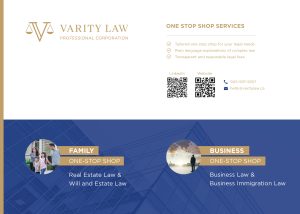Hi everyone, this is Sabrina, a business lawyer at Varity Law. Throughout the years, we did free consultations with many entrepreneurs who suffered when buying a business. They paid high expenses, inherited the sellers’ debts, and had expensive litigations. To help everyone avoid such misfortunes, today I will summarize 3 points that makes for a much safer business purchase.
When Making the Offer, Decide whether to buy shares or Assets
This is the most common dispute. It’s confusing because buying shares and assets are both called “buying the business”. So, what’s the difference?
If you are becoming the new owner of the seller’s company, then you are buying shares. This means you are taking over their business bank account and business name.
If you are buying part of the seller’s company, namely their assets, then it is an asset purchase. Asset can include anything owned by the seller’s company, including real estate, equipment, furniture & tools, etc. But you are not taking over the seller company’s bank accounts. Even if you are buying 100% of their assets, as long as you are not the new owners of the selling company, then it is still an asset purchase.
Understanding the nuances between buying shares and assets is crucial in business transactions. While shares entail ownership of the entire company, asset purchases involve acquiring specific components, such as real estate secured lending. This distinction significantly impacts the legal and financial aspects of the transaction.
So, what should you do – buy shares or assets? Let’s look at the advantages and disadvantages of each.
Asset Purchase – Advantages :
- As the buyer, you won’t inherit any debts, lawsuits, or other problems related to the seller’s company – but you must ensure the assets you are buying are problem-free (our law firm will check this for you – we will see if the seller owns the assets, if there are debts or lawsuits attached to the assets, and whether the seller has gone bankrupt before selling the assets to you)
- As you are not buying the company, you would not inherit any of the seller’s employees, obligations, or contracts
- The purchase process will be simpler and cheaper
Asset Purchase – Disadvantages:
- The only thing you bought are the assets. As your business name will change, there is no guarantee that the seller’s previous clients will become your new clients;
- The seller may continue using their business name and set up a competing shop elsewhere;
- You must set up everything not related to the assets yourself – such as a business bank account, trademarks, employees and contractors, etc.

Share purchase – advantages:
- As you are buying the seller’s company, you also receive their business name and business bank account;
- Goodwill is easier to inherit; as you are using the same business name, the seller’s clients will likely become your clients;
- The seller cannot use the same business name when opening a new shop – to protect yourself even further, your lawyer can draft a non-compete clause into the purchase agreement
Share purchase – disadvantages:
- You will inherit all of the seller company’s problems, including debts, wages owing, lawsuits, contractual obligations, etc. – your lawyer should discover and resolve such problems before you complete the purchase (aka before closing date);
- The purchase process will be more complex and more expensive;
- If the seller’s company did not complete their corporate minute book, they must immediately complete one before the purchase concludes.
The first step to purchasing a business is a letter of intent (LOI) (you can draft this yourself). On there, you should include:
- Are you buying shares or assets;
- The purchase price;
- What are the assets of the selling corporation? Make a list.
- Any debts, obligations, or other problems you do not intend to inherit;
- Non-compete clause, if necessary;
- Conditions that let you out of this purchase agreement – for example, your lawyer must review the agreement or the landlord must agree to assign the lease – if the conditions are unfulfilled, you can terminate this agreement and get your deposit back

Buying Using Personal Name vs. Company Name
As a buyer, should you buy using your personal name (e.g. Jack Smith) or company name (e.g. Jack Family Farm Inc.)? Let’s compare the pros and cons.
Buying Using Your Personal Name – Advantages:
- You do not need to incorporate a company before purchasing;
- All purchased shares or assets only belong to you – you do not need to share with other co-owners;
- It’s easier to operate the business under your personal name –you only need to file your personal income taxes – no need to file corporate taxes!
Buying Using Your Personal Name – Disadvantages:
- Unlimited liability – if you operate the business under your personal name and you owe debt or get into a lawsuit, all of your personal assets (e.g. house and bank accounts under your personal name) is at risk
- If your business makes a good amount of money (e.g. over $80,000 per year), then you pay a lot of personal income taxes; but if you had a corporation, usually you pay much less taxes
- When you inevitably pass, your beneficiaries must pay estate administration taxes before they can inherit your business (approx. 1.5% of the entire estate)

Buying under Company Name – Advantages:
- Limited liability – only the money you put into your business is at risk for debt collection and lawsuits – your personal assets are protected (as long as you did not do a personal guarantee, you do not owe employee wages, and you are not a director being sued by a shareholder)
- Deferred taxes – your annual profits are taxed at a lower rate if you leave the money in the corporation vs. giving it all to yourself
- No estate administration taxes – if you do a corporate will, your beneficiaries can inherit your business without paying estate admin taxes
Buying under Company Name – Disadvantages:
- If you co-own your company with other people, then you need to share your profits;
- More admin work – every year you must file your personal taxes and corporate taxes
- Harder to get a loan– in most cases, lender would require personal guarantees
For most people, buying using your company name is better than using your personal name. If you remain undecided, then you MUST include on clause on your LOI, stating that you can take title under your personal or corporate name in the future.
Lease Assignment
Often, you want to take over the selling company’s location. In most cases, the seller rented the place from a landlord – so a lease assignment from the seller to the buyer must be made. Landlord’s consent to lease assignment must be added on your offer – if the landlord refuse to transfer the lease to the buyer, then the buyer can back out of the deal risk-free.

You should get your business lawyer to review the lease agreement and assignment for you. They especially need to ensure:
- Does the seller owe the landlord any money? If so, this must be resolved before the purchase is completed – the buyer should not be inheriting this debt;
- Can you, as the new tenant, assign the lease again in the future? Can you be like the seller and sell your company along with the lease? The landlord is likely to say no future assignments is allowed
- Are you inheriting the same lease, or is the landlord doing a new lease? Would all the details, such as rent and common expenses, remain the same? The landlord will likely increase the fees if it’s a new lease.
As a commercial lease usually lasts for 5 years or more, it is crucial to ensure your lawyer cross the Ts and dot the Is.
Conclusion
When purchasing a business, there are many ways to ensure you do not suffer losses, inherit debts, or get into lawsuits.
Those include (1) deciding if you are buying shares or assets (2) choosing to buy under your personal name or company name (3) examining all the details of your lease agreement and assignment.
If you have any concerns, you can put down an Offer, but ensure you include a solicitor review condition – so once your lawyer discover problems, you can back out of the agreement risk-free.
This blog is meant to offer general legal information. For legal advice relating to your specific situation, please book a 1st free consultation with us: https://calendly.com/sabrina-668/1stfreeconsult







